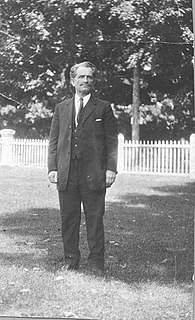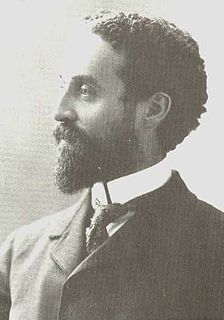A Quote by Boris Sidis
The fact that psychology postulates an external material world and studies it in so far as it comes to be reflected in consciousness, points to another postulate which psychology must assume in addition, namely, the existence of an inner world consciousness.
Related Quotes
This "new" idea of God proposes that all the characteristics traditionally attributed to the purely external God are, in an important sense, attributes of this inner force of consciousness. When this inner energy of higher consciousness is experienced, it then becomes clear that such an energy permeates the entire universe. In this way, it is through self-knowledge that the existence of an external God is verified and understood.
When we pause to think, we are compelled to admit the existence of consciousness as the primal and surest fact. What we know of the great world around is known through our states of consciousness, and if we seem to be living a merely objective life, amidst external things, it is because we have become oblivious of the real nature of experience.
Looking at the world from other species' points of view is a cure for the disease of human self-importance. You suddenly realize that consciousness - which we value and we consider the crowning achievement of nature, human consciousness - is really just another set of tools for getting along in the world.
My view is that consciousness, the seat of "personalness," is the ultimate reality, and is also scientifically impenetrable. In other words, there is no scientific test one can postulate that would definitively prove its existence in another entity. We assume that other biological human persons, at least those who are at least acting conscious, are indeed conscious. But this too is an assumption, and this shared human consensus breaks down when we go beyond human experience (e.g., the debate on animal consciousness, and by extension animal rights).
What do I think happens when we die? I think we enter into another stage of existence or another state of consciousness that is so extraordinarily different from the reality we have here in the physical world that the language we have is not yet adequate to describe this other state of existence or consciousness. Based on what I have heard from thousands of people, we enter into a realm of joy, light, peace, and love in which we discover that the process of knowledge does not stop when we die. Instead, the process of learning and development goes on for eternity.
The whole drift of my education goes to persuade me that the world of our present consciousness is only one out of many worlds of consciousness that exist, and that those other worlds must contain experiences which have a meaning for our life also; and that although in the main their experiences and those of this world keep discrete, yet the two become continuous at certain points, and higher energies filter in.
You are so accustomed to think of yourselves as bodies having consciousness that you just cannot imagine consciousness as having bodies. Once you realize that bodily existence is but a state of mind, a movement in consciousness, that the ocean of consciousness is infinite and eternal, and that, when in touch with consciousness, you are the witness only, you will be able to withdraw beyond consciousness altogether.
Fear arises through identification with form, whether it be a material possession, a physical body, a social role, a self-image, a thought, or an emotion. It arises through unawareness of the formless inner dimension of consciousness or spirit, which is the essence of who you are. You are trapped in object consciousness, unaware of the dimension of inner space which alone is true freedom.


































